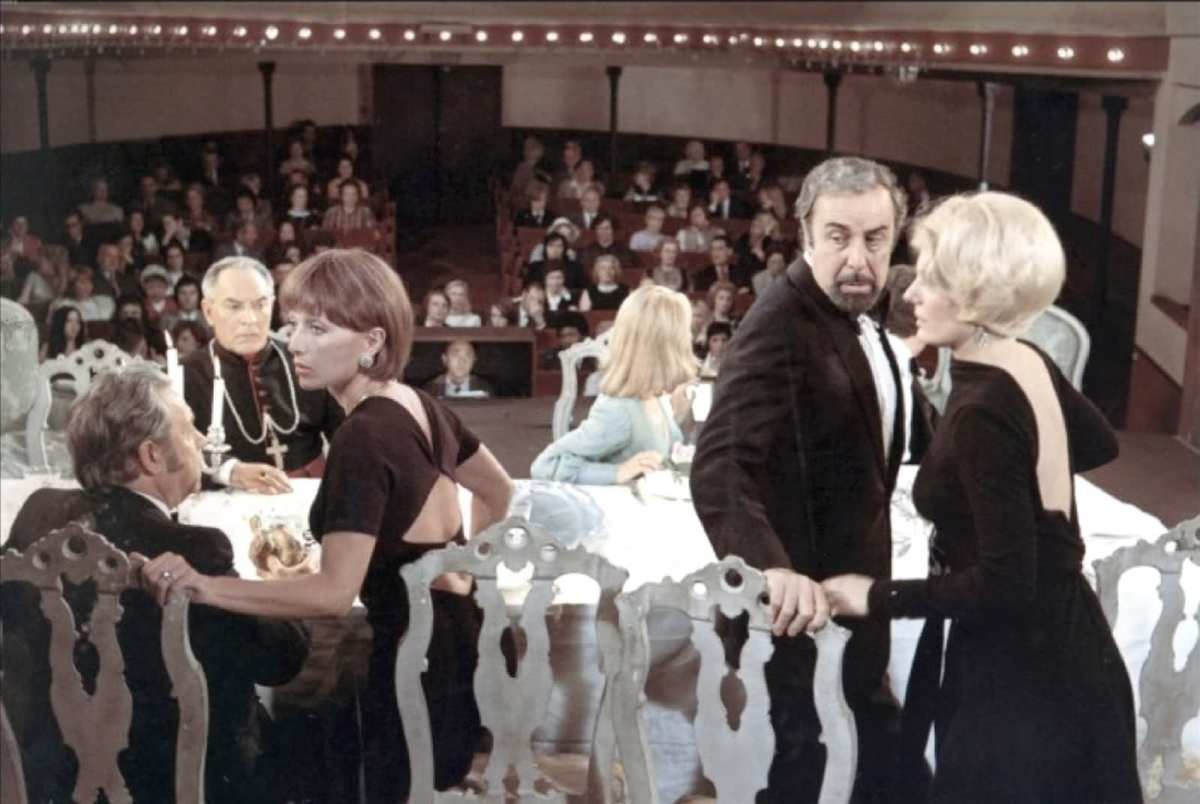It’s 1973. North Norfolk. My husband’s parents live in a little village near the Sandringham estate, country retreat of the royal family. They’ve mentioned before how the old retainer ( ‘Keeper of the Drapes’) there, Bob, is a bit of a mate, and sporadically he is allowed to invite friends along to special film evenings. The Family apparently get to enjoy a pre-release film occasionally, it’s one of the perks of being royal, and they like to be joined by a few of the local village proletariat, to make it seem like a real cinema. Poor things, this is the nearest they can get to going to the pictures. The previous year they’d been treated to The Magnificent Seven Deadly Sins, a British offering starring Bruce Forsyth, Bernard Bresslaw, Joan Sims and Leslie Phillips.
As we arrive for a long weekend we’re greeted with good news – there’s to be another film at The Big House, and we’re all invited! But our horror at the thought of giving in to being graciously allowed to swell the ranks of the peasantry so as to provide a suitably convivial backdrop evaporates when we hear the name of the film – ‘It’s The Discreet Charms of the Boudoir… or something,’ declares my father in law. My husband and I (to coin a phrase) exchange bemused, wildly hopeful glances…could it be?? We’ve read about it, we’ve lusted after seeing it, but so far it hasn’t been seen on British soil…
So, through the dark night we drive, arriving at the tradesman’s entrance of the great house. We’re welcomed by old Bob, who prefaces the night’s entertainment by showing us around some of the behind-stairs area and outhouses, culminating in the pièce, or rather siège, de résistance – the lavatory which King George V used to use when he’d been out doing a spot of shootin’. A few at a time we peer through the door, giving it as much wild surmize as we can muster, for Bob’s sake. In the kitchen, where sandwiches are set out for us, we question Bob on what film it is we are actually going to see, and again he repeats the mantra – The Discreet Charms of the Boudoir. At this point many of the gents of the party give out lascivious looks… good old royals, eh, they know how to pick ’em!
Now it’s time to assemble. We enter the Japanese Ballroom, a sizeable reception room, though hardly big enough for what you would expect of a royal ball. It does have, however, a powerful Japanese presence, being hung about the walls and ceilings with bits of dark and malign-looking oriental armour and weapons. Towards the back are two or three rows of dainty seats, with more commodious seating in front. As newcomers, we two are marshalled to sit at the back. My in-laws, having been twice before, are allowed onto the front rank of chairs, as the Queen likes to have a look round and recognise a few faces… Enter the royal party onto the becushioned sofas. We stand. There’s HM herself, Prince Philip, full of bonhomie, the Queen Mum trotting gamely in, a duke and a duchess, various royal-ish hangers on. They’ve all got that after-dinner look. Good evening, good evening, oh, DO sit down. And we’re off.
And we really are off, because it’s what we hope, and what the royals don’t expect – Bunuel’s masterpiece, and we’re seeing it NOW, in this company, before anyone else in the world that we know. We can’t see their reactions, sadly, it’s too dark, and there’s not a sound, in fact there’s that kind of meta-sound of virtual question-marks boinging out of heads. Where’s the Boudoir? Where’s the Charm?? My god, subtitles! The people around us relax into it gradually, but you can’t escape the fact that a great guffaw going up from that front row would lighten things up no end. Where’s Charles when you need him? I do my bit by quietly laughing down my nostrils, because that’s all I ever do, I’m not a laugher out loud in cinemas, in general. Would I have dared to, if I were?
But what delicious pleasure – overlaying the joy of the film, there’s the wicked simultaneous awareness of where we are. Not being a proper cinema it’s not entirely dark, and you can never quite forget the menacing oriental shapes all above and around, and you see the light of Bunuel’s images reflecting off the screen and onto this oddest of odd set of people, in this stuffy bastion of the old order, somewhere near the sea in the flat lands of eastern England, and how you wish Bunuel could be there.
Then it’s over. There’s a palpable relief, and the royal party rises, so we do too. There’s a general ‘Thank you and goodnight’ sort of turning towards us. Then Philip speaks. ‘Well, I don’t know what you made of that! Hope you have pleasant dreams.’ Indeed we will.
Written September 2007 for Bunuel-a-thon (Flickhead)




